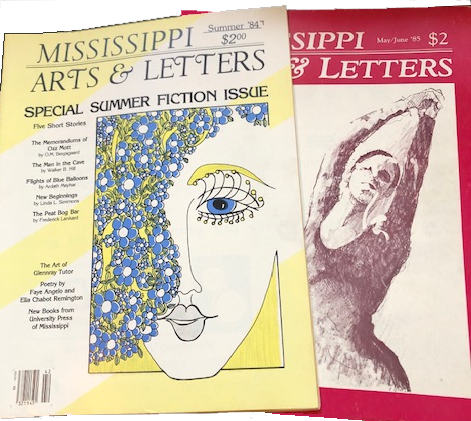
Our first independent publishing venture after leaving New York and Everything for Everybody, decades before Mud Flat Press, was first a newspaper, Persons, in Hattiesburg, Mississippi, and then a statewide literary and arts quarterly, Mississippi arts & Letters, which won us a certain amount of notoriety. but was a financial flop. It lasted only a couple of years. We published fiction, non-fiction and poetry by many of the best writers in Mississippi and the South at the time, including poetry by Johnny Wink and Larry Johnson; fiction by Howard Bahr, Harry Calhoun, and Ardath Mayhar; and art by Glennray Tutor, Robin Street, and Harold Van Houten.
It was a labor of love. I wrote book reviews, articles about writers and visual artists, at least one short story, and a silly column called “Publisher’s Privilege.” My wife and co-founder/publisher, Gabi Clayton, and I did most of the illustrations and covers. My favorite piece was an article called “Writing in Faulkner’s Shadow,” in which I asked five of the best of contemporary Southern writers—Barry Hannah, Jes Simmons, Howard Bahr, Jack Butler, and Larry Johnson—what it is like to write in the huge shadow cast by William Faulkner.
Johnson contributed poetry, book reviews and much more, and he introduced us to the works of many great writers we were not previously aware of including Simmons and Butler. Johnson was the first to introduce us to the work of Cormac McCarthy. A quote from his review of McCarthy’s Blood Meridian was used as a cover blurb on the first paperback edition.
McCarthy’s prose style has no exact equivalent and few equals in English. As usual, he hews from the strata of our language wondrous words we never knew existed, and places them with exquisite care in his iridescent mosaic. His art is made of a prose that soars, staggers, howls, bleeds and leers according to the fortunes of his characters. For all their supercharged grandeur and violence, however, these are no surreal visions as on finds in Marquez, Borges, or Cenetti. The descriptions are hard and clear, though they shimmer around the edges at times. The beauty and horror are only too real. There is no escape into madness—only a continued gallop of rainbow-crystal awareness toward the abyss of destiny and death, which is the only release.
Johnson reviewed Larry Brown’s collection of short stories, Facing the Music, before Brown published his first novel, Dirty Work. Johnson was so impressed with Brown’s writing that he struck up a correspondence with him and even drove up to Oxford to meet him in person.
Through Larry Johnson, Gabi and I also got to be friends with Larry Brown, but only through correspondence; we never met in person. He submitted a short story to us that we would have published, but it was too late. Only a week or so before we got it, we had been forced to declare bankruptcy and cease publication. Shortly after that, Brown became hugely famous throughout the South if not throughout the world. Tragically, he died in 2004.
I started to title this article “Our fifteen minutes of almost being famous.” That almost-fame came in the form of a delightful article by Carol Bagley in our hometown newspaper, “TLC Important to Area Publishers” and in being named by Writers Digest one of the top 100 fiction markets in America. We hated having to give up publication of Mississippi Arts & Letters, but we cherish the memories.

You published my Preacher Love in the 80s.